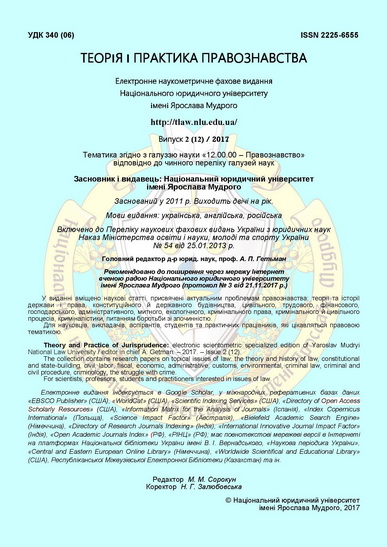Genesis of legal regulation of non-contractual obligations arising out of unilateral lawful actions.
DOI:
https://doi.org/10.21564/2225-6555.2017.12.117286Keywords:
one-way lawful actions, a public promise of remuneration, actions without an order, rescueAbstract
The evolution of the legal regulation of obligations on unilateral lawful acts, starting with the Roman private law, which defined the notion of obligation, as well as the classification of obligations was carried out. The first obligations were divided into those arising from the contract and for the offense . Over time, commitments from unilateral covenants or some other facts that are not related to contracts or offenses are distinguished. The Romans expanded the glories of the Tories, which identified some unilateral acts. The French Civil Code of 1804, as quasi-treaty, regulated the conduct of alien cases without commission and unfounded enrichment. The German Civil Code regulated such obligations on unilateral lawful actions: a public promise of remuneration, a competition and the conduct of cases without a mandate. These codified normative acts have had a great influence on the legislation of pre-revolutionary Russia. The German Civil Code served as the basis for the Central Committee of the UkrSSR as an indirect link of the reception of Roman private law. The Central Committee of Ukraine introduced a classification of obligations on a contractual and non-contractual basis. The latter include, in particular, obligations of unilateral lawful actions, such as a public promise of remuneration, the commission of actions in the property interests of another person without its commission, the salvation of the health and life of an individual, the property of a natural or legal person, the acquisition, preservation of property without sufficient legal basis. There are tendencies in the settlement of obligations on unilateral lawful actions at the level of a separate institute sub-branch of obligatory law and the allocation of subspecies of such obligations within the species.References
Agarkov, M.M. (2002). Izbrannye trudy po grazhdanskomu pravu. (Vols. 1–5); Vol. 1. Moscow: AO «Centr JurInfoR» [in Ukrainian].
Joffe, O.S. (1961). Sovetskoe grazhdanskoe pravo. Ch. 2. Leningrad: Tip. PO LGU [in Russian].
Kofanov, L.L. (1994). Objazatel'stvennoe pravo v Arhaicheskom Rime: Dolgovoj vopros (VI–IV vv. do n.je.). Moscow: Jurist [in Russian].
Sanfilippe, Chezare. (2000). Kurs rims'kogo chastogo prava. D.V. Dozhdev (Ed.). Moscow: BEK [in Russian].
Pokrovs'kij, I.A. (1998). Osnovnye problemy grazhdanskogo prava. Moscow: Statut [in Russian].
Muromcev, S.A. (2003). Grazhdanskoe pravo Drevnego Rima. Moscow: Statut [in Russian].
Pamjatniki rimskogo prava: Zakony ХП tablic. Institucii Gaja. Digesty Justiniana. (1997). Moscow: Zercalo [in Russian].
Franchozi, Dzh. (2004). Institucionnyj kurs rimskogo prava. L.L. Kofanov (Ed.). Moscow: Statut [in Russian].
Ioffe, O.S., Musin, V.A. (1974). Osnovy rimskogo grazhdanskogo prava. Leningrad: Izd-vo Leningr. un-ta [in Russian].
Zadorozhnyi, Iu.A. (2006). Formuvannia instytutu pozadohovirnykh zobov’iazan u rymskomu pravi. Biuleten Ministerstva yustytsii Ukrainy, 10, 116 [in Ukrainian].
Rimskoe chastnoe pravo. I.B. Novickogo, I.S. Pereterskogo (Ed.). (1996). Moscow: Jurist [in Russian].
Haritonov, E.O. (2000). Rimskoe chastnoe pravo. Kharkiv: Odissej [in Ukrainian].
Poldnikov, D.Ju. (2008). Dogovornye teorii glossatorov. Moscow: Academia [in Russian].
Bartoshek, M. (1989). Rimskoe pravo: (Ponjatija, terminy, opredelenija). Moscow: Jurid. lit [in Russian].
Francuzskij grazhdanskij kodeks. D.G. Lavrov (Ed.). (2004). Sankt-Peterburg: Juridicheskij centr Press [in Russian].
Bergmann, V. (Ed.). Grazhdanskoe ulozhenie Germanii: Vvodnyj zakon k Grazhdanskomu ulozheniju [Bürgerliches Gesetzbuch Deutschlands mit Einführungsgesetz]. (2006). A.L. Makovskij (et al.). Moscow: Volters Kluver [in Russian].
Kharytonov, Ie.O., Kharytonova, O.I. (1999). Retseptsii pryvatnoho prava: paradyhma prohresu. Kirovohrad: Tsentralno-Ukrainske vyd-vo, 136 [in Ukrainian].
Pleniuk/ M. (2014). Evoliutsiini etapy formuvannia zobov’iazannia u dorevoliutsiinyi period. Yurydychna Ukraina, 7, 49 [in Ukrainian].
Gercenberg, V.Je., Pereterskij, I.S. (1914). Objazatel'stvennoe pravo. Kn. 5: Grazhdanskogo ulozhenija izdana s razreshenija Ministra justicii. Sankt-Peterburg: Izd-vo jurid. knizhnogo sklada «Pravo», 208–211 [in Russian].
Sinajskij, V.I. (1911). Russkoe grazhdanskoe pravo. Kiev, issue 2: Objazatel'stvennoe, smejnoe i nasledstvennoe prava [in Russian].
Tsyvilnyi Kodeks URSR. ().1927Kharkiv: Vyd-vo Narkomiustu [in Ukrainian].
Maj, S.K. (1953). Ocherk obshhej chasti burzhuaznogo objazatel'stvennogo prava. Moscow: Vneshtorgizdat, 24–25 [in Russian].
Savat'e, R. (1972). Teorija objazatel'stv. Juridicheskij i jekonomicheskij ocherk. Moscow: Progress, 49–50 [in Russian].
Godeme, E. (1948). Obshhaja teorija objazatel'stv. Moscow: Juridicheskoe izd-vo Ministerstva justicii SSSR, 304–305 [in Russian].
Sovetskoe grazhdanskoe pravo. Ch. 1. V.F. Maslov (Ed.). (1977). Kiev: IO «Vishha shkola», Golovnoe izdatel'stvo, 378 [in Russian].
Grazhdanskoe pravo. E.A. Suhanov (Ed.). (Vols. 1–2; Vol. 2). (1993). Moscow: BEK [in Russian].
Holubieva, N.Iu. (2013). Zobov’iazannia u tsyvilnomu pravi Ukrainy: metodolohichni zasady pravovoho rehuliuvannia. Odesa: Feniks, 95 [in Ukrainian].
Vedomosti VS SSSR. 1991, 26, art. 733 [in Russian].
Tsyvilnyi kodeks Ukrainy. Proekt vid 25.08.1996 r. (1996). Ukrainske pravo, 2 [in Ukrainian].
Grazhdanskij kodeks Kvebeka. (1999). Moscow: Statut [in Russian].
Grazhdanskoe zakonodatel'stvo KNR. (1997). Moscow: Mezhdunarodnyj centr finansovo-jekonomicheskogo razvitija, 30 [in Russian].
Downloads
Published
How to Cite
Issue
Section
License
Copyright (c) 2017 Theory and practice of jurisprudence

This work is licensed under a Creative Commons Attribution 4.0 International License.




